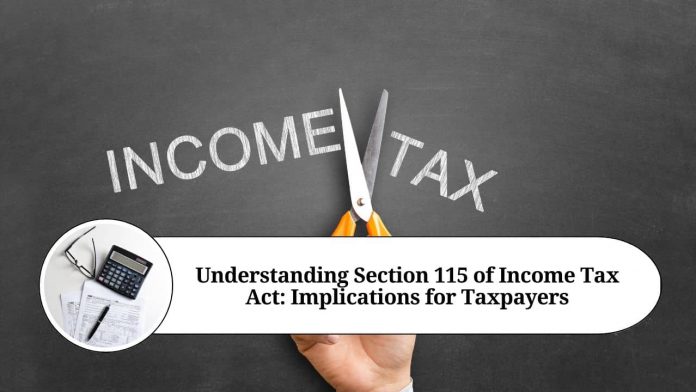Section 115 of the Income Tax Act governs the tax implications of income generated from foreign sources. It is an essential provision for businesses and individuals operating globally. Section 115(1) provides for the taxability of foreign income earned by a resident Indian. In contrast, Section 115A provides for the taxation of income earned by non-residents from sources in India. In this article, we will analyze the provisions of Section 115 and its implications for taxpayers.
Understanding Section 115:
Section 115(1) provides that any income received or accrued by a resident Indian from a source outside India shall be taxable in India. This includes income from a business, profession, or other sources. The income will be taxed at the normal tax rates applicable to the taxpayer.
The scope of income taxable under Section 115 is extensive and covers various types of income. For example, income earned by a resident Indian from a business or profession carried on outside India will be taxable under this section. Similarly, rental income earned by a resident Indian from a property situated outside India will also be taxable under Section 115.
Section 115A provides for the taxation of income earned by non-residents from sources in India. Non-residents can either be individuals or companies. The section provides for different tax rates depending on the income’s nature. For example, the tax rate for royalties and fees for technical services is 10%, while the tax rate for interest income is 20%.
Implications for Taxpayers:
Section 115 has several implications for taxpayers, both residents’s, and non-residents. We will discuss some of the important implications below.
- Compliance Requirements:
Section 115 requires taxpayers to comply with certain reporting and documentation requirements. For example, taxpayers must file a tax return reporting their foreign income. They must also maintain records and documentation to support their claims of foreign income. Failure to comply with these requirements can result in penalties and interest.
- Double Taxation:
One of the significant concerns for taxpayers with foreign income is the possibility of double taxation. Double taxation occurs when the same income is taxed twice in two jurisdictions. Section 115 provides relief from double taxation by allowing taxpayers to claim a credit for foreign taxes paid. The credit is allowed against the tax liability in India on the same income. This ensures that the same income is not taxed twice.
- Tax Planning:
Section 115 also provides opportunities for tax planning for taxpayers with foreign income. For example, taxpayers can structure their investments to take advantage of the lower tax rates under Section 115A. They can also use tax treaties between India and other countries to minimize their tax liability.
Final Conclusion:
In conclusion, Section 115 is an important provision of the Income Tax Act for taxpayers with foreign income. The section provides for the taxability of foreign income earned by resident Indians and income earned by non-residents from sources in India. It also provides relief from double taxation and opportunities for tax planning. Taxpayers must comply with the reporting and documentation requirements under the section to avoid penalties and interest.
Read Other Useful Blogs:
Frequently Asked Questions:
Q: What is Section 115 of the Income Tax Act?
A: Section 115 of the Income Tax Act pertains to the taxation of income received by an individual or entity in the form of royalty or technical fees. It provides provisions for the deduction of tax at source by the payer of such income.
Q: Who is liable to deduct tax at source under Section 115 of the Income Tax Act?
A: The payer of the income in the form of royalty or technical fees is liable to deduct tax at source under Section 115 of the Income Tax Act.
Q: What is the rate of tax deduction under Section 115 of the Income Tax Act?
A: The rate of tax deduction under Section 115 of the Income Tax Act is 10% for payments made to residents and 20% for payments made to non-residents.
Q: What is the time limit for depositing tax deducted at source under Section 115 of the Income Tax Act?
A: Tax deducted at source under Section 115 of the Income Tax Act must be deposited with the government within 7 days from the end of the month in which the deduction is made.
Q: Is there any exemption from tax deduction under Section 115 of the Income Tax Act?
A: Yes, there are certain exemptions from tax deductions under Section 115 of the Income Tax Act. These include cases where the amount of royalty or technical fee does not exceed Rs. 30,000 or where the payer is a resident individual or HUF whose books of account are not required to be audited.
Q: What is the penalty for non-compliance with Section 115 of the Income Tax Act?
A: Non-compliance with Section 115 of the Income Tax Act may attract a penalty equal to the amount of tax not deducted or not deposited within the prescribed time limit, along with interest.
Q: Is there any provision for obtaining a lower tax deduction certificate under Section 115 of the Income Tax Act?
A: Yes, a taxpayer can apply for a lower tax deduction certificate under Section 197 of the Income Tax Act if they believe that the tax deduction rate prescribed under Section 115 is higher than their actual tax liability.




















